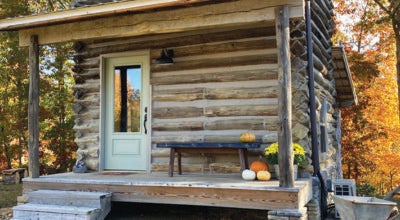The Literary Corner: Renegade Writer’s Guild
Published 8:27 am Thursday, March 11, 2021
|
Getting your Trinity Audio player ready...
|
The Gift
By Julie Terry Cartner
Moonlight flowing through the window flooded the room, giving the appearance of dawn. Only the corner farthest from the window was still enshrouded in darkness. The corner holding Gran’s old rocking chair, now creaking rhythmically as though someone were in it, gently rocking to and fro. I looked at the clock. Three a.m. I groaned. Three a.m. Again. I had awakened each of the last several nights at precisely the same time. But, each night, as the room had become brighter, I had felt closer to an answer. Now, tonight, the moon was full, and, as my eyes adjusted to the glowing light, I discerned a shape in the chair, a small, almost childlike shape, and I knew. Gran. She’d be irked by the description, but at 4’ 10”, she was often confused for a child, that is until you looked into eyes that carried the knowledge of generations.
“Gran, is that you?” I asked, not knowing whether I spoke with my mouth or my mind. Not that it mattered; she’d been gone for twenty-five years. Yet, despite the logic, I still knew it was she who sat there, and I needed to hear what she had to say.
“I’ve been visiting you all week,” she grumbled. “I’m glad you finally listened to your heart instead of your brain and figured out I was here. You have the gift, a’ leanbh, I fear you haven’t been practicing.”
A’ leanbh. How long had it been since Gran had called me that? Suddenly the ache in my heart threatened to explode. How I missed Gran, her lilting Irish words interposed with the English, her stories, her inexplicable gifts, as she called them, her very being.
“No time for emotion, not now,” she said. “Listen. My house, the house my husband, my love, built for me, is for sale. An open house is planned for Saturday. You need to go.”
“But Gran,” I can’t afford that house…” I started.
“Hush now and listen,” came her feisty retort. “I need you to find something I hid long ago. Go to the open house and into my bedroom. In the closet there are two shelves, one longer, one shorter. Under the shorter shelf you’ll find a small lever. Pull it. It will open a hidden panel on the opposite wall. Retrieve the box and leave.” Then anticipating my next question, she continued, “Don’t worry; it’s legal. It’s your inheritance.” With that cryptic statement, she stopped talking, the chair stopped creaking, and all was still.
“Gran,” I called, in vain. I knew she was gone.
Within an hour I was on my way. Ten hours later, I pulled into a driveway I knew as well as my own. How many times had I crossed this driveway following the sound of piano music being played by a master, my Gran? I mourned the For Sale sign but tabled that emotion for later. Entering through the front door was almost foreign. We always went in through the back, then through the window that separated the kitchen from the living room, a child’s delightful secret entrance.
Obeying instructions, I headed for the bedroom and opened the closet door. Be it luck or Gran’s interference, the room was empty, nobody around to see my actions. Within seconds, I felt the lever, pulled it and turned to the exposed alcove. Feeling around in the dark, I found a box, small enough to fit into my coat pocket. After making sure nothing else resided in the niche, I gently closed the door, then nonchalantly wandered through the rest of the house, collecting memories like treasures in a chest, a final farewell.
Opening the box gently, the way any gift should be cherished, I discovered a necklace, a gold filagree Celtic cross, and a note. “My dearest a’leanbh, if you have found this, I am gone, and we have visited. I know how sad and lonely you feel. The year has been a most difficult one. When you wear this necklace, the love of generations of family will embrace you. For wherever there is family, there is love. Clasping the necklace around my throat, I finally allowed the tears to fall.
Greener Grass
By Gaye Hoots
Two months after I bought my condo in Oriental, I pulled up to the parking lot’s entry. One of the things I loved was the view of the water looking at the bridge and across where the Neuse River spills into the ocean. A house was going up. The heavy equipment was digging into the mud there. This area was so low and wet that I did not believe you could build a house there. The scene was my view from my bedroom window and did not interfere with my water view from the back of the condo, yet I couldn’t help but think how nice it would be to buy a choice lot with scenery like that and build.
The builder had completed the frame and roof a month ago. When I arrived two weeks ago, the outside was finished with doors and windows installed, but it was unoccupied. You could see through the house where the back and front windows aligned, and there were posted signs at the drive.
Several lots on our road had for sale signs, so Cami called to get prices on a lot. The owner told her he had sold the prime lot that the new house stood on to a couple building the house for their son. He and his wife had raised their children in Texas, where his wife’s family lived. The parents planned to give the home to him either as a vacation home or a primary residence. It was their way to get him closer to them so they could spend more time with him and his family.
The original owner explained to Cami that the man had died, and his wife preferred to remain in Texas. The bank had posted the notices while the property was reverting to the parents who had purchased it. He didn’t know if they would sell it unfinished or complete it before putting it on the market.
It was sad to think that this man didn’t get to enjoy his dream but reassuring that he knew his parents were making an effort to complete his plan and have time with him. We never know someone’s circumstances, but wherever we are, life can throw a curveball. Try to enjoy every day and make the most of it. Our dreams can motivate us and keep us going, but don’t lose today planning for tomorrow.
Davie History Books
By Marie Craig
Our small county, Davie County, has a lot of interesting history. Many books and maps help researchers learn more details. We have a wonderful Martin-Wall History Room at the Davie County Public Library in Mocksville. Books, maps, microfilm, periodicals, computers, and files can be searched there.
Most of these resources are available for purchase. There are 28 books and 5 maps that will enhance your own library and your appreciation of our county’s history. I have created a Website, https://sites.google.com/view/dchgsbooksmaps, that lists these items. Clicking on a title will direct you to a new page that describes this one work thoroughly with information of cost and access for buying at the library or ordering.
Authors included are Charles Crenshaw and Ronnie Smith with their two Looking Back photo books of history; Jim Rumley, author of the Cooleemee history book; Ann Frick, sketches and details; the Miller sisters from Cooleemee who compiled a book about those serving in the Civil War; Kirk Mohney researching and describing Davie architecture; Jamie Moore editing his father’s memoirs about Davie; Debbie Dotson and Jane McAllister’s two books of historic photos; Betty West’s book about Cana; Marie Craig’s eight history books; Marcia Phillips’ book about four Davie mavericks who changed history; Pat Mason’s book listing Eaton’s Cemetery burials; Everette Sain who assisted in transcribing U.S. Census into book form with index; and last Nancy Murphy who compiled and typed 3 census books, 2 cemetery books, and 2 marriage books. She donated her work to Davie County Historical and Genealogical Society who published these books and sells them. Her contribution was before the Internet, and the books were heavily used.
Maps are by J.T. Alderman (1885); Wilson F. Merrill (1928); Hugh Lagle Land Grant (1976); Fred Hughes (1977); and Emery Rosenbaum (2020).
Have a look at the website above and see if you would like to come to the library to use some of them or buy them for your own library.





